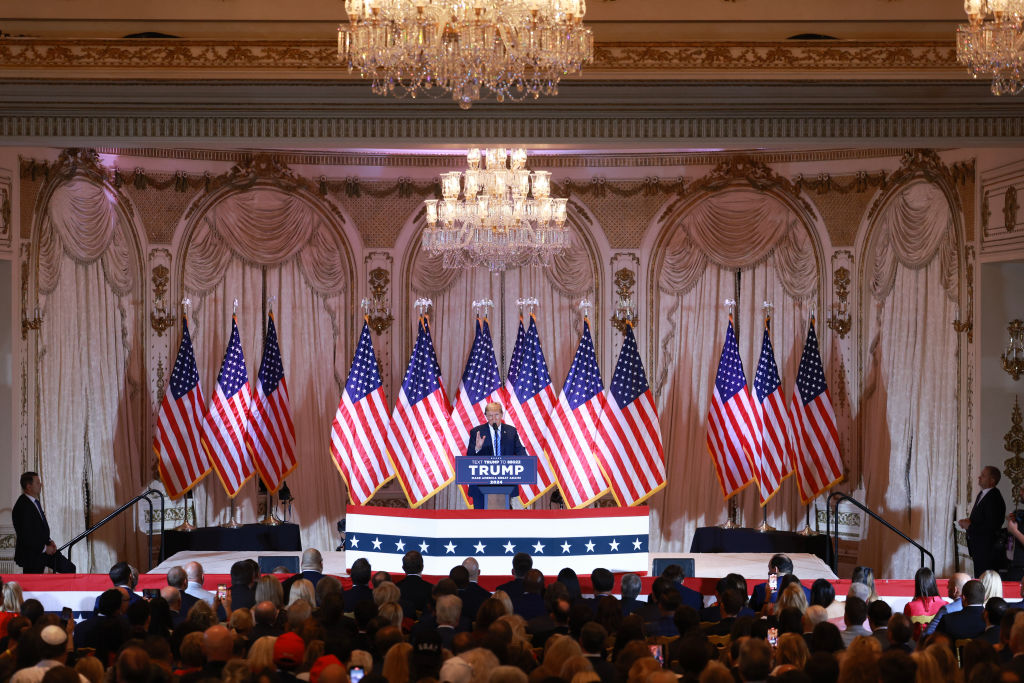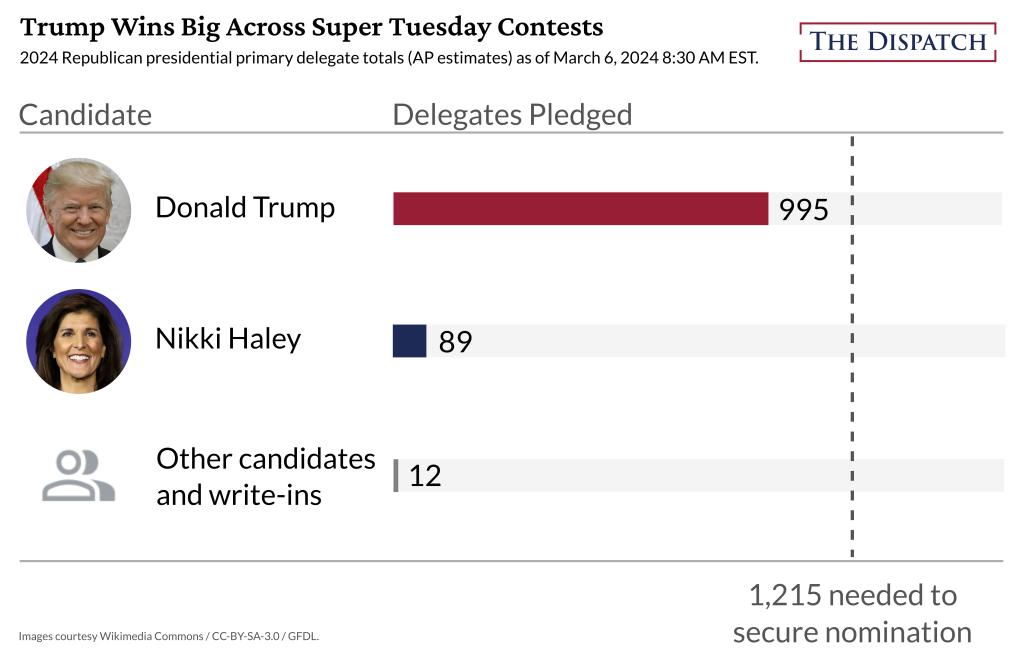Happy Wednesday! The Dispatch is looking to expand the visual offerings accompanying our newsletters and articles. If you are an artist or graphic designer and interested in working with us on a freelance basis, please fill out this form.
Quick Hits: Today’s Top Stories
- Former President Donald Trump was projected to win 14 of 15 states in last night’s Super Tuesday primary contests, adding hundreds of delegates to his already large lead and closing in on formally clinching the Republican nomination for president. Former Ambassador Nikki Haley won just one state last night, Vermont, and added nine delegates to her tally. President Joe Biden won primary contests in 14 states last night, though a protest movement by progressive voters in Minnesota upset with Biden’s handling of the Israel-Hamas war did net 19 percent support for “uncommitted,” enough to win eight delegates. The Wall Street Journal reported this morning that Haley will speak at 10 a.m. ET to suspend her campaign, though she is not expected to endorse Trump.
- U.S. military cargo planes dropped a second round of humanitarian aid into the Gaza Strip on Tuesday, delivering more than 36,800 meals as part of a joint operation with the Jordanian military. “The [Department of Defense] humanitarian airdrops contribute to ongoing U.S. and partner nation government efforts to provide life-saving humanitarian assistance to the people in Gaza,” U.S. Central Command wrote in a statement on Tuesday. “We continue planning for follow-on aid delivery missions. These airdrops are part of a sustained effort to get more aid into Gaza, including by expanding the flow of aid through land corridors.” The first aid drop, which took place on Saturday, delivered more than 38,000 ready-to-eat meals.
- Prosecutors announced a superseding indictment on Tuesday against Democratic Sen. Bob Menendez of New Jersey and his wife, adding a dozen charges, including obstruction, bribery, extortion, and acting as a foreign agent as a public official. Menendez was already facing four conspiracy counts related to the underlying “substantive crimes” charged in the new indictment. Prosecutors have alleged Menedez and his wife accepted bribes—including gold bars, cash, and a luxury car—in exchange for helping the Egyptian and Qatari governments and three businessmen.
- The Department of Education on Tuesday fined Liberty University—a Christian school in Virginia—$14 million for violations of the Clery Act, which requires schools that receive any federal funding to collect data on campus crime and share information about threats with students. According to an investigation, Liberty had failed to adequately comply with elements of the Clery Act related to preventing and investigating sexual assault and harassment; federal officials also found that Liberty had not collected complete or accurate crime statistics. This is the largest fine ever imposed under the Clery Act, and the terms of the settlement between the university and the Department of Education also require Liberty to spend $2 million to improve campus safety.
- Federal prosecutors on Tuesday indicted 63-year-old David Franklin Slater, a civilian employee of the Air Force and former U.S. Army lieutenant colonel, for allegedly sharing classified national defense information related to the war in Ukraine on a “foreign online dating platform.” He was passing the information to a co-conspirator who “claimed to be a female living in Ukraine on the foreign dating website,” the Justice Department alleged. “The co-conspirator regularly asked Slater to provide her with sensitive, non-public, closely held and classified [national defense information] and called Slater in their messages her ‘secret informant love’ and her ‘secret agent.’”
- Republican Sen. Tom Cotton of Arkansas announced Tuesday he will seek the role of GOP conference chair, the third-ranking leadership position among Senate Republicans. The current conference chair, Sen. John Barrasso of Wyoming, said he will run for Senate GOP whip, the second-ranking post in the party, instead of joining the race to succeed outgoing Minority Leader Mitch McConnell.
- Sen. Kyrsten Sinema of Arizona, a Democrat-turned-Independent, announced on Tuesday she will not run for reelection, narrowing what would have been a three-person race with Democratic Rep. Ruben Gallego and failed GOP gubernatorial candidate Kari Lake. “Because I choose civility, understanding, listening, working together to get stuff done, I will leave the Senate at the end of this year,” she said in a video. Sen. John Thune of South Dakota, who is running to succeed McConnell, endorsed Lake’s Senate bid earlier this morning.
- The Department of Treasury on Tuesday banned Greece-based software developer Intellexa, which created spyware that can turn smartphones into surveillance devices, from doing business in the U.S. The program, called Predator, has reportedly been sold to governments that have used it to target U.S. officials, journalists, and activists.

The biggest winner of yesterday’s “Super Tuesday” primary elections night wasn’t former President Donald Trump, former South Carolina Gov. Nikki Haley, or President Joe Biden. It was Jason Palmer, an entrepreneur and investor who beat Biden in American Samoa’s Democratic presidential caucuses last night, securing the territory’s six delegates. “You’re probably wondering, ‘Who is this Jason Palmer, I’ve never heard of him,’” Palmer, who campaigned in the territory via Zoom, told Samoan voters in a video message posted on his campaign’s YouTube channel last week. “Well, in the mainland, I’m actually very well known as an education technology leader, investor, and executive.” He won the territory with 51 votes.
In the comparably less exciting contest on the Republican side, the result was as predicted. GOP primary voters across the country filtered through school gyms, libraries, churches, and even garages to cast ballots overwhelmingly for Trump, who swept 14 of the 15 states that held primaries on Tuesday. Haley managed to eke out a narrow victory in one state, but it’s now only a matter of time before the former president officially locks down the nomination. The Wall Street Journal reported earlier this morning that Haley is set to deliver remarks at 10 a.m. ET today and suspend her campaign.
Heading into Super Tuesday, polling suggested Haley could have a decent showing in a couple of states. But even in most of those contests, the question was never whether Haley could actually win outright, only if she could eat into Trump’s margin of victory enough to peel away some delegates. Vermont was the one exception—Haley clinched the state, winning 50 percent of the vote to Trump’s 46 percent, likely on the backs of independent and even Democratic voters given the state’s open primary. (Haley also nabbed an endorsement from the state’s moderate Republican Gov. Phil Scott in January.)
Haley also outperformed polling in some states. FiveThirtyEight’s polling average in Virginia, for example, put Haley’s support in the Commonwealth at 17 percent, but she ended up receiving 35 percent of the vote yesterday. In Massachusetts, she got 37 percent, up eight points from her polling average in the state. Yet she couldn’t replicate her success in Vermont, ultimately losing Virginia by 28 points and Massachusetts by 23. Trump won Alabama, Alaska, North Carolina, Oklahoma, Tennessee, Arkansas, Texas, and California by at least 50 points.
The former president entered Super Tuesday with 273 delegates to the Republican National Convention, so he couldn’t have reached the requisite threshold of 1,215 even if he secured all 854 up for grabs yesterday. As of this reporting, Trump has secured 995 delegates to Haley’s 89, giving him a chance to officially sew up the nomination within the next few weeks. But with Haley expected to end her bid later this morning, the delegate math is only a formality at this point.

The spotlight was understandably on Trump and Haley last night, but yesterday’s contests also provided several consequential down-ballot results. In the closely watched North Carolina gubernatorial primary, Republican Lieutenant Gov. Mark Robinson and Democratic Attorney General Josh Stein each clinched their respective parties’ nominations in what could be one of the most expensive and divisive elections in the country. Robinson—who Trump has called “Martin Luther King on steroids”—has a history of inflammatory remarks, including an instance where he seemed to question the occurrence of the Holocaust. Though North Carolina has swung for Trump twice, the state has a history of splitting ballots, electing just one Republican governor in the 21st century.
In Texas, Democratic Rep. Colin Allred won his party’s Senate primary and will face Republican Sen. Ted Cruz in November. In California’s open primary, where the top two candidates compete in the general election, Democratic Rep. Adam Schiff was projected to take the top spot. Retired baseball star Steve Garvey, a Republican, was projected to take second—beating Democratic Reps. Katie Porter and Barbara Lee, setting up what will likely be a much easier contest for Schiff in the fall. (Porter has accused Schiff of intentionally running ads to boost Garvey in the final days of the campaign. She and Lee will both leave Congress when their terms end next January.)
But the most important result from last night, of course, is the end of the 2024 Republican primary contest. “Nikki Haley plans to suspend her Republican presidential primary bid in a speech Wednesday morning,” the Wall Street Journal reported about an hour ago, citing “people familiar” with her plans. “Haley won’t announce an endorsement Wednesday, the people said. She will encourage Donald Trump, who is close to having the delegates needed to win the GOP nomination, to earn the support of Republican and independent voters who backed her.”
Whether Trump does so could play a big role in the outcome in November. Though the majority of Republican primary voters said they would vote for whoever wins the nomination, exit polling by NBC News shows that these are small majorities: In North Carolina, 63 percent of voters indicated that they would support the nominee regardless of who it was. In California and Virginia, that number was under 60 percent.
A CBS News exit poll from North Carolina broke these numbers down further. While the vast majority of Trump voters said they would vote for the Republican nominee “no matter who it is,” just 21 percent of Haley supporters said the same. Haley herself has pointed to the bubbling dissatisfaction within the Republican Party. “Don’t expect them to automatically vote with the party just because,” she said Friday in a Dispatch Podcast interview. “If they feel unwanted, if they feel unheard, if they feel like the Republican Party’s not even trying to get them, they either won’t vote—which, I hope they do, we should always vote—or they will find some other person to vote for.”
Of course, the general election is still months away, and the Trump campaign will likely win over some of these defectors (unless the former president makes good on his promise to permanently bar Haley supporters from his movement). And other metrics—especially from Republican voters, not independents voting in open primaries—show just how firm a grasp Trump and his claims have on the party. A Virginia exit poll showed that just 15 percent of Trump voters believe Biden legitimately won the 2020 election, compared to 87 percent of Haley voters who think Biden won fair and square.
Trump delivered a victory speech last night from Mar-a-Lago, which consisted almost entirely of slamming Biden—the “worst president in the history of our country”—and touting his self-described successes from his first term. “We have a great Republican Party with tremendous talent and we want to have unity, and we’re going to have unity, and it’s going to happen very quickly,” he said last night. “Success will bring unity to our country.”
He didn’t mention Haley once.
Haley had no events scheduled for last night and didn’t deliver any remarks reacting to the results. “Unity is not achieved by simply claiming ‘we’re united,’” Olivia Perez-Cubas, a spokesperson for the Haley campaign, said yesterday. “Today, in state after state, there remains a large block of Republican primary voters who are expressing deep concerns about Donald Trump. That is not the unity our party needs for success.”
Biden had a good night himself, barring the embarrassing but ultimately inconsequential loss in American Samoa. He won 14 contests, though he ceded a few delegates to the “uncommitted” candidate in Minnesota, a continuation of a protest movement that emerged in the Michigan primary by progressives upset with the administration’s Israel policy. Still, the president set his sights on the general election and a showdown with Trump. “Tonight’s results leave the American people with a clear choice,” Biden said last night. “Are we going to keep moving forward or will we allow Donald Trump to drag us backwards into the chaos, division, and darkness that defined his term in office?”
Worth Your Time
- It’s no secret that cable news can contribute to partisan bubbles. Writing for the Washington Post, Philip Bump illustrates the ways Fox News has insulated viewers from former President Donald Trump’s scandals. After a former aide to Sen. Joe Manchin, Jonathan Kott, suggested Trump had dined with Nazis on a Fox segment earlier this week, “Tammy Bruce, a conservative radio host, took issue with that statement,” Bump wrote. “‘We just heard him call a number of Republicans Nazis and racists,’ she said. Kott wasn’t simply pulling accusations out of a hat, however. Contrary to Bruce’s assertion, he was referring to one specific moment: Trump’s sitting down for dinner with the rapper Ye (formerly Kanye West) and white nationalist Nick Fuentes in November 2022. He wasn’t calling Republicans racists and Nazis, he was using the former term to describe some of Trump’s rhetoric and the latter to refer to a specific individual. If Bruce’s main source of news is right-wing media like Fox News, though, she might never have heard about that dinner. In November and the first half of December of 2022, the incident was mentioned in 89 segments on CNN and more than twice that number on MSNBC. On Fox, though? It was only mentioned seven times, total. This is very much in keeping with a long-standing pattern at the channel. News that is bad for Trump is muted or limited—including poll numbers from the network’s own pollsters.”
Presented Without Comment
Democratic Rep. Dean Phillips, who is primarying President Joe Biden, on yesterday’s Super Tuesday results:
“Congratulations to Joe Biden, Uncommitted, Marianne Williamson, and Nikki Haley for demonstrating more appeal to Democratic Party loyalists than me.”
Also Presented Without Comment
Semafor: Russia Uses Facial Recognition to Detain [Alexei] Navalny Funeral Attendees
Toeing the Company Line
- Declan, Drucker, John, and Steve reviewed the results from Super Tuesday and took questions from audience members on the state of the 2024 race on last night’s episode of Dispatch Live (🔒). Members who missed the conversation can catch a rerun, either video or audio-only, by clicking here.
- Alex fact-checked whether a “Glock switch” can turn a semiautomatic firearm into an automatic weapon.
- In the newsletters: Nick imagined (🔒) what could have been in the Republican primary had Trump’s 2020 election lies been dismissed early and often.
- On the podcasts: Henry Barbour, Republican National Committeeman from Mississippi, joined the Dispatch Podcast to discuss his proposed resolutions that would bar the RNC from spending money on Trump’s legal bills. And on today’s episode of The Remnant, Jonah is joined by Cass Sunstein to discuss Sunstein’s new book on habit formation.
- On the site today: Jonah points out the flaws in accusing Israel of committing “genocide” in Gaza, and Brent Orrell and David Veldran review a new book outlining a “third way” between “college for everyone” and “learn a trade.”
Let Us Know
Do you think former President Donald Trump will work to win over skeptical Nikki Haley voters? Or will he focus on turning out his core base?








Please note that we at The Dispatch hold ourselves, our work, and our commenters to a higher standard than other places on the internet. We welcome comments that foster genuine debate or discussion—including comments critical of us or our work—but responses that include ad hominem attacks on fellow Dispatch members or are intended to stoke fear and anger may be moderated.
With your membership, you only have the ability to comment on The Morning Dispatch articles. Consider upgrading to join the conversation everywhere.